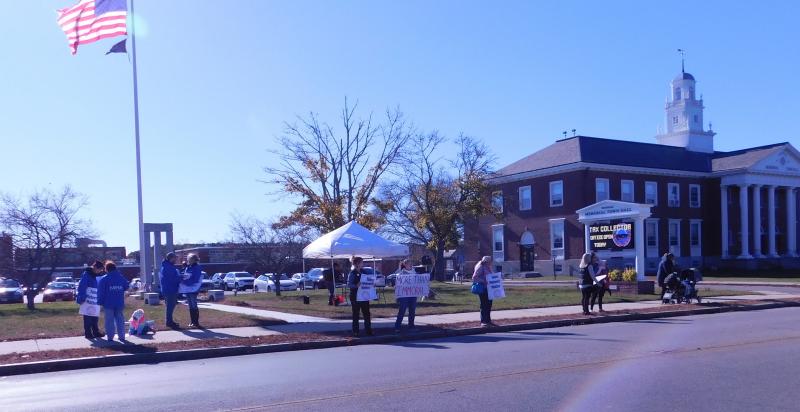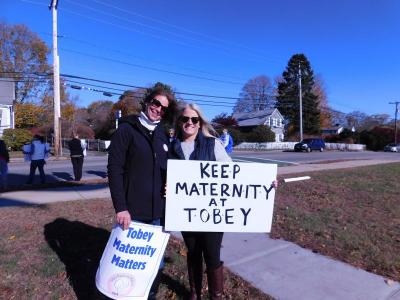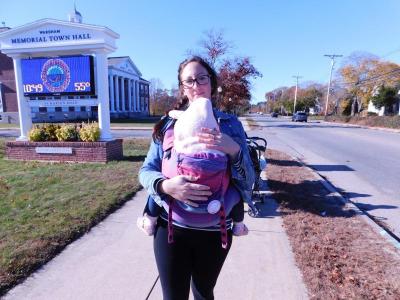Protesters say Tobey’s maternity ward is essential
Nurses, mothers, and grandmothers gathered outside Town Hall on Friday morning to protest Southcoast Health’s decision to close the maternity ward at Tobey Hospital.
The hospital group said the decision was made due to the low number of births at Tobey and because the maternity unit at St. Luke’s Hospital in New Bedford is being expanded.
“We’re devastated,” said Amy Marshall, a nurse who has been working in the unit for more than thirty years. “We love our patients.”
Marshall said that the unit’s nurses tend to stay for years, which is very unusual, and that the team has more than 300 years of experience between them.
Marshall emphasised measures in which Tobey outperforms St. Lukes: The maternity unit at Tobey has a very low c-section rate at 14.9 percent, while St. Luke’s has a rate of 25 percent. Tobey was designated a Baby Friendly Hospital in 2011, meaning that the ward encourages mothers to begin breastfeeding and support them while in the hospital and after they leave. St. Luke’s received that designation in January.
Beyond the numbers, she explained, Tobey Hospital’s maternity ward has a culture of care. In part due to the low number of births, every mother and baby gets very personal care.
“We have a connection with patients that doesn’t end when they leave,” said Marshall. She said that many patients will call the ward with questions at all hours of the day and night, and that nurses are often able to have them stop by for help with lactation or any other concerns they have.
A spokesperson for Southcoast said that St. Luke’s is more likely to deal with preterm babies, those who require special care, and some transferred from Tobey because of “heightened needs.”
Alison Noyce, a nurse who worked in the maternity ward at Tobey for ten years, gave birth to two children there, and her children have had three grandchildren in the ward. One of her daughters is due in January and is devastated that she will not be able to give birth at Tobey.
Noyce emphasised that mothers and babies are among the most vulnerable community members.
“The care people get at Tobey should be the rule, not the exception,” Noyce said.
Catherine Freitas, a registered nurse who has dealt with complicated health issues in her family, chose Tobey Hospital as the place to give birth because she wanted minimal intervention: no I.V., no epidural. She said that the emotional support and care she experienced at Tobey was especially valuable because her mother passed away in 2015, and so the family she brought to the hospital was all men: her father, brother, and partner.
“It was like having twelve mothers,” she recalled.
She continued to get support at the hospital’s biweekly breastfeeding support group, and came to the protest with her 22-month-old daughter, Ella.
“It makes me physically ill that they would remove [the unit] for financial reasons,” Freitas said. “To put a price tag on that is sick. It has truly made me question other medical decisions.”
Due to past experiences she has had at St. Lukes, she said she would not feel comfortable giving birth there, and would likely need to travel to Boston or Cambridge to get the care she wants if she has another baby.
Anthea Tripanier, who lives across the street from St. Luke’s, had both her children at Tobey because she had heard great things about the unit and she did not want to have a c-section.
Kathryn Vicino had her son at Tobey, and is upset at the idea that she might not be able to have her future children there. She said she valued the “homey” environment Tobey provided, which she couldn’t get at St. Luke’s.
Lisa Field, the associate director of the legislative division of the Massachusetts Nursing Association, said she thinks Southcoast’s choice to close Tobey’s maternity ward will echo that of Steward Medical Group’s decision to close the maternity unit at Morton Hospital in Taunton. Steward, a similar company to Southcoast, closed Morton Hospital’s maternity ward in December 2018 and directed expecting mothers to the group’s larger hospital in Brockton.
Field recounted patients going to the Brockton hospital, only to face overcrowding, a lack of beds, and a shortage of nurses. She said that more women are receiving less prenatal care and showing up at emergency rooms to give birth.
“The need doesn’t go away when the hospital closes the service,” Field said.
The Massachusetts Department of Public Health held a hearing on the unit’s closure on Oct. 23, which was attended by dozens of people, most of whom opposed the unit’s closure. The department can determine the service provided to be essential to the community, but it does not have the ability to force Southcoast to keep the ward open.

















